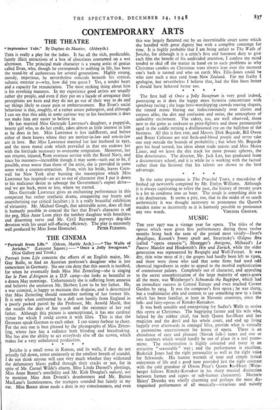CONTEMPORARY ARTS
THE THEATRE
September Tide." By Daphne du Maurier. (Aidwych.)
Tins is really a play for the ladies. It has all the rich, predictable, faintly illicit attractions of a box of chocolates consumed on a wet afternoon. The principal male character is a young artist of genius called Evan, who, though he corresponds to nothing in life, has been the stand-by of authoresses for several generations. Highly strung, moody, imperious, he nevertheless conceals beneath his cynical, sultanic exterior a—why, how did you guess ? Yes, a tender heart and a capacity for renunciation. The most striking thing about him is his revolting manners. In my experience good artists are usually rather shy people, and even if they put on a facade of arrogance their perceptions are keen and they do not go out of their way to do and say things likely to cause pain or embarrassment. But Evan's social behaviour is that, roughly, of a rather astute poltergeist, and although I can see that this adds in some curious way to his fascination it does not make him any easier to believe in.
He has married Miss Gertrude Lawrence's daughter, a puppyish, breezy girl who, to do her credit, takes almost as little interest in him as he does in her. Miss Lawrence is less indifferent, and before either of them knows where they are mother-in-law and son-in-law are in love. But Miss Lawrence married her late husband in 1925, and the stern moral code which prevailed in that era endows her with the fortitude necessary to overcome temptation. Moreover, her son returns, injured, lirom overseas service with the Royal Navy, and since his manners—incredible though it may seem—turn out to be, if possible, even worse than those of the artist, she is provided in some sense with a counter-attraction. Evan, with his bride, leaves Corn- wall for New York after burning the masterpiece which Miss Lawrence has inspired—an act so out of character that I put it down to his malicious-desire to sabotage the Government's export drive— and we are back, more or less, where we started.
Miss Gertrude Lawrence gives an enchanting performance in this competent but rather synthetic drama, conquering our hearts and anaesthetising our critical faculties ; it is a really beautiful exhibition of virtuosity. Mr. Michael Gough, that admirable actor, does all that is humanly possible to conceal the fact that Evan's character is off the peg, Miss Anne Leon plays the tomboy daughter with breathless and disarming verve and Mr. Cyril Raymond purveys dog-like devotion with his usual self-effacing efficiency. The play is extremely
well produced by Miss Irene Hentschel. PETER FLEMING.


































 Previous page
Previous page